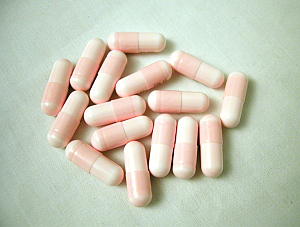About medications and the thyroid
There are several medications which can affect the function of the thyroid gland. Although medications have been developed to deliberately change the function of the thyroid for therapeutic purposes; medications for non-thyroid issues can change the function of the gland.
Table of contents
- Amiodarone
- Lithium
- Tyrosine Kinase Inhibitors
- Interferon Treatment
- Sex Steroids
- Oestrogen
- Androgens
- References
How medications affect thyroid function
Amiodarone
A medication which is well recognised for altering thyroid function is Amiodarone. Amiodarone is an anti-arrhythmic drug that is used to help control abnormal heart rhythms (dysrhythmia). Amiodarone has several mechanisms of action in the cardiac tissue to exert its anti-arrhythmic effect; including prolonging the refractory period of the cardiac muscle action potential and inhibiting sodium and potassium channels. Its weaker effects include inhibition of calcium channels and some anti-sympathetic action[i]. Amiodarone has a number of adverse effects, including nausea, vomiting, constipation, changes in taste and peripheral neuropathy. It is renowned for causing thyroid dysfunction; a major toxicity associated with the drug. Amiodarone contains iodine molecules in its chemical structure, and is structurally similar to thyroxine (one of the thyroid hormones). It can act on nuclear thyroid hormone receptors – this is the proposed mechanism for its toxicities, and some of its anti-arrhythmic effects.
The effect that Amiodarone exerts on the thyroid correlates with the iodine intake in certain parts of the world. Amiodarone more commonly causes hypothyroidism in regions of the world which are iodine deficient, whereas it is more likely to cause thyrotoxicosis in areas of the world which do not have the same degree of dietary iodine deficiency(1). It is also important to be aware of the Wolff-Chaikoff effect; where there is a transient rise in the levels of thyroid stimulating hormone (TSH) in the first few months of Amiodarone treatment. This is not serious and does not warrant treatment; it is most likely to be the result of increased exposure to iodine(3).
Thyrotoxicosis can develop quickly and without warning soon after commencing Amiodarone therapy, or may occur after several years of treatment. It can also develop months after stopping Amiodarone, as the drug can be stored in other tissues and be released at a later point in time. Thyrotoxicosis can occur in normal thyroid glands, or in those with pre-existing thyroid disease. A further issue with Amiodarone-induced thyrotoxicosis is that the typical symptoms associated with thyrotoxicosis are not always observed in Amiodarone patients because the drug has anti-adrenergic effects and impairs the conversion of T4 to T3. One symptom that may be an indication of Amiodarone-induced thyrotoxicosis is a deterioration of the underlying cardiac disease(4). Furthermore, it is difficult to treat Amiodarone-induced thyrotoxicosis effectively. There is a high content of iodine within the affected thyroid gland, which makes the use of Carbimazole (a drug used to treat hyperthyroidism/thyrotoxicosis) less effective. Carbimazole is a drug that impairs the synthesis of thyroid hormones by inhibiting thyroid peroxidase(4).
There are several risk factors which may influence the development of Amiodarone-induced hypothyroidism. These include the aforementioned factor of living in an area of endemic iodine deficiency, female gender, and positive thyroid antibody statuss(3). It is thought that one reason for the development of Amiodarone-induced hypothyroidism is an inability to escape or overcome the Wolff-Chaikoff effect(3). Hypothyroidism is not always permanent; with 50% of patients returning to a euthyroid state after 2-3 months of Amiodarone cessation; however, for others, hypothyroidism is permanent. Hypothyroidism is more likely to be permanent in patients who have antibodies against the thyroid(3).

Lithium
Lithium is most commonly used in the treatment of bipolar disorder. Lithium exerts a number of effects on the monoamines within the brain to produce its therapeutic effects. However, it also exerts effects on the thyroid gland, and hence, a side effect of lithium is thyroid dysfunction. Lithium inhibits the release of thyroid hormones, which can lead to hypothyroidism. Lithium also affects the hypothalamic-pituitary-thyroid axis, and receptor mediated mechanisms of thyroid hormone action. Therapeutic lithium can produce these effects on thyroid physiology because it is concentrated in the thyroid itself, as well as the hypothalamus and pituitary gland which regulate the thyroid’s activity. Lithium is also known to produce a diffuse goitre(5). The incidence of hypothyroidism is six times greater in patients receiving lithium treatment compared to the normal population; and is a particular issue in bipolar patients as hypothyroidism increases the chances of developing clinical depression.
If a patient receiving lithium therapy develops hypothyroidism, this is not an indication to cease treatment. Patients should undergo regular thyroid function tests to assess and monitor thyroid function, and commence thyroxine therapy if hypothyroidism is apparent(6). Lithium therapy can still continue. If a diffuse goitre develops, there are also several treatment options available. Levothyroxine is often administered to patients with diffuse goitre, as it is an effective treatment against lithium-induced goitre. This drug becomes less effective over time due to fibrosis of the gland. Surgery is indicated if Levothyroxine is not effective, or if symptoms of neck compression become apparent(5).
Lithium can also impair the function of the anatomically-related parathyroid glands. Lithium treatment can invoke hyperparathyroidism; causing elevated levels of parathyroid hormone in the bloodstream. Parathyroid hormone promotes the release of stored calcium from the bones, and hence, the levels of calcium in the bloodstream are elevated; a state known as hypercalcaemia(6). If hyperparathyroidism and hypercalcaemia result, treatment with lithium should be ceased.
Tyrosine Kinase Inhibitors
Tyrosine kinase inhibitors are a class of drug used in the treatment of various types of cancer, including medullary thyroid cancer. As the name suggests, these drugs are inhibitors of the enzyme tyrosine kinase. Tyrosine kinases transfer a phosphate group from adenosine triphosphate to cellular proteins. When mutated, tyrosine kinases cause unregulated cell growth and can lead to the development of cancer; and hence, targeting this enzyme therapeutically can arrest tumour growth.
Although used therapeutically to treat some forms of thyroid cancer, tyrosine kinase inhibitors can produce adverse effects in the thyroid gland; namely hypothyroidism. One type of tyrosine kinase inhibitor, Sunitinib, is thought to produce hypothyroidism via exerting a direct toxicity on the thyroid tissue itself. The exact mechanism of this is as yet unknown, but there are several theories including inhibition of thyroid peroxidase, VEGFR blockade producing regression of thyroid blood vessels and thyroiditis (both immune and non-immune aetiologies have been proposed). Other inhibitors are also believed to induce hypothyroidism via indirect mechanisms(7).

Interferon Treatment
Interferon-α is used in the treatment of hepatitis C and some malignancies. Interferons are cytokines produced by the body and are involved in the immune response. They are synthesised and released by cells of the body when infection is present. Interferons have several roles and functions, including:
- Communication between cells and co-ordination of the immune response
- Interference with the replication of viruses within cells
- Increase antigen presentation to the T cells of the immune system
- Activation of macrophages and natural killer cells (cells of the immune system)
Interferon-α and other therapeutic interferons are synthetic forms of the naturally occurring cytokines. A common, recognised side effect of interferon-α treatment is thyroiditis. Broadly speaking, there are two forms of interferon induced thyroiditis; these are autoimmune interferon-induced thyroiditis and non-autoimmune thyroiditis. The former is characterised by the production of anti-thyroid antibodies. The main types of autoimmune interferon induced thyroiditis, in order of most common to least common, are:
- Presence of anti-thyroid antibodies without clinical manifestations
- Hashimoto’s thyroiditis
- Graves’ disease
Non-autoimmune interferon induced thyroiditis presents in the following ways:
- Destructive thyroiditis (most common): most cases are mild or subclinical; has an early thyrotoxic phase and a late phase of hypothyroidism
- Hypothyroidism without the presence of auto-antibodies(8)
The treatment for interferon induced thyroiditis depends on the manifestation. Those presenting with Graves’ disease are treated with either radioactive iodine treatment or surgery. Anti-thyroid medications are not used because they can lead to liver dysfunction(8). Patients with destructive thyroiditis are treated with beta-blockers. Those who develop hypothyroidism are treated with thyroid hormone replacement therapy(8). Thankfully, the thyroid dysfunction is transient in the majority of patients.

Sex Steroids
Oestrogens and androgens (male sex hormones) have a range of therapeutic applications; and like the other aforementioned medications, can alter thyroid function. Both oestrogens and androgens affect levels of thyroxine binding globulin, the principal protein in the circulation involved in transporting thyroid hormones around the body. Oestrogen causes an increase in the level of thyroxine binding globulin, whereas androgens cause a decrease in thyroxine binding globulins.
Oestrogen
The effect of oestrogen on the thyroid depends on the thyroid status of the individual being treated. These effects are summarised in Table 1.
| Thyroid Status | Effect of oestrogen therapy |
| Euthyroid | Increased concentration of thyroxine binding globulin with a parallel increase in thyroxine. Euthyroid individuals are able to adapt readily to the changes in thyroxine binding globulin, develop a new steady state and regulate levels of free thyroxine and thyroid stimulating hormone within the normal range(10) |
| Hypothyroid | Hypothyroid patients are commonly treated with levothyroxine. Hypothyroid women treated with levothyroxine also exhibit a similar increase in levels of thyroxine binding globulin as euthyroid women. However, in hypothyroid women treated with levothyroxine, there is a decrease in the level of free thyroxine and an increase in serum thyroid stimulating hormone(10) |
| Hyperthyroid | Not as widely studied, but there is also an observed increase in thyroxine binding globulin and decrease in free thyroxine levels; which can lead to the improvement of symptoms associated with Graves’ disease(10) |
Table 1: Effects of oestrogen treatment in patients with different thyroid status.
Androgens
Similarly, the effects of androgens differ depending on the thyroid status of the patient receiving androgen therapy. These effects are summarised in Table 2.
| Thyroid Status | Effect of androgen therapy |
| Euthyroid | Euthyroid patients treated for breast cancer with fluoxymesterone (a non-aromatisable androgen) exhibited a decrease in serum thyroxine binding globulin, total T3 & thyroxine and unchanged free thyroxine levels and thyroid stimulating hormone levels(10) |
| Hypothyroid | Hypothyroid patients who have been treated with levothyroxine and were treated with androgen fluoxymesterone for breast cancer. These patients experienced a dramatic decrease in serum thyroxine binding globulin and total thyroxine levels; however, there was an increase in free thyroxine and decrease in thyroid stimulating hormone. These patients were clinically hyperthyroid(10) |
| Hyperthyroid | No formal studies(10) |
Table 2: Effects of androgen therapy in patients of differing thyroid status.
This articles provides general information about how medications can affect thyroid function. It is important that clinicians recognize the effects of medications on the thyroid gland. The accurate interpretation of abnormal thyroid function test results may be complicated by medications and non-thyroidal illnesses. Accordingly, medication-induced thyroid gland dysfunction should be considered in the management of patients with abnormal thyroid function tests and clinical features relating to the thyroid. If you have questions or concerns about thyroid health make an appointment to see our thyroid surgeon.
References
- Campbell TJ. 2005. Amiodarone. Aust Pres, 2005;28:150-4.
- Sampson K.J., Kass R.S. (2011). Chapter 29. Anti-Arrhythmic Drugs. In Brunton L.L., Chabner B.A., Knollmann B.C. (Eds),Goodman & Gilman’s The Pharmacological Basis of Therapeutics, 12e
- Barbesino G. Drugs affecting thyroid function. Thyroid, 2010;20(7):763-770
- George J., & Joshi SR. Drugs and thyroid. JAPI, 2007;55:215-223
- Lazarus JH. Lithium and thyroid. Best Practice & Research Clinical Endocrinology & Metabolism, 2009;23:723-733
- Malhi GS, Tanious M, Bargh D, Das P, Berk M. Safe and effective use of lithium. Aust Pres, 2013:36(1):18-21
- Sherman SI. Tyrosine kinase inhibitors and the thyroid. Best Practice & Research Clinical Endocrinology & Metabolism, 2009;23:713-722
- Tomer Y, Menconi F. Interferon induced thyroiditis. Best Practice & Research Clinical Endocrinology & Metabolism, 2009;23:703-712
- Dong BJ. How medications affect thyroid function. Western J Med, 2000:172(2):102-106
- Tahboub R, Arafah BM. Sex steroids and the thyroid. Best Practice & Research Clinical Endocrinology & Metabolism, 2009;23:769-780

